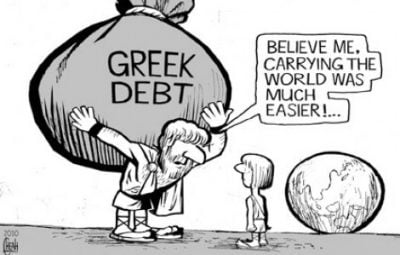Still More Austerity Imposed in Greece

Public demonstrations and opposition arising once again in Greece, as the Troika (European Commission, European Central Bank, IMF) demand still more austerity measures (pension cuts, privatizations, tax hikes) as part of the latest maneuvering by the Troika and its Syriza Greek government ally in anticipation of a renewal of yet another ‘debt deal’ later this year in 2018. The old deal–the third established in 2015–is scheduled to end this summer. The Troika-Syriza intend to ‘roll it over’. Thus the new demands for continuing and more austerity raised well before the expiration of the 2015 debt agreement.
Elections for Greece’s parliament, where Syriza has a narrow majority, would have to follow later in 2018, so the Troika-Syriza government seek to wrap up a new agreement on debt before the expiration and new elections.
This sad scenario has been going on since 2010, with no end in sight since there’s no way Greece’s economy can repay the interest and principal on hundreds of billions of dollars of debt imposed on it by pro-Eurozone Greek governments. It is perpetual interest payments for decades to come. 95% of the debt interest payments end up in German and other northern European banks, according to German university institute studies.
As I indicated in my September 2016 book, ‘Looting Greece: A New Financial Imperialism Emerges’, Clarity Press, it amounts to a new kind of imperialism based on financial payments for debt imposed by pan-European political institutions (Troika) on the smaller economies of the Eurozone periphery. (see book reviews and select chapters from the book on this blog’s book roll on the right side of this page. Orders at discount are available by clicking on the book icon–or on Amazon and elsewhere).
Unlike classic imperialism–e.g. 19th century British version–where factories and production were set up in the colonial country to produce goods sold at cost with low wages to British capitalist owners, who then shipped the goods back to the UK, and from there resold them at a higher price in the UK or Europe–the new 21st century financial imperialism exploits the entire economy by requiring debt interest payments to be paid by the colonial government to the banks and investors in the ‘host’ country. The payments are made by imposing fiscal austerity measures on the society being exploited. It’s a new form of ‘colonialism’ where the exploitation is ‘socialised’ and generalized, most of which is ‘paid for’ by pensioners retirement cuts, government workers’ layoffs and wage and benefit cuts, by colonial governments’ privatizing social services and public goods (sold to foreign investors to raise cash to pay the interest), and by tax hikes on households and small businesses to gain revenues with which to pay the interest on the debt.
Watch my most recent interview with Press TV on the latest demonstrations in Greece and popular resistance, which will intensify once again as the current Troika-Syriza government debt agreement expires in 2018.
To watch, go to Youtube at:
See my prior 2016 Youtube interviews on the 2015 prior Troika-Syriza debt deal at:

